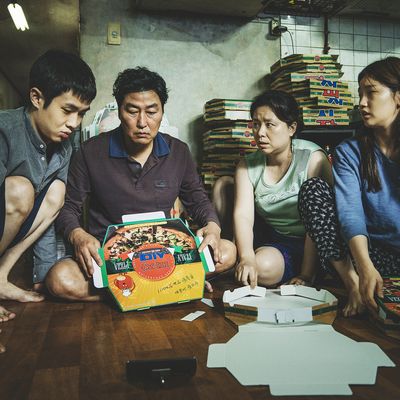
Tuesday was supposed to be Quentin Tarantino’s big day at Cannes — and for a while, it was, as the director’s Once Upon a Time in Hollywood was quite well-received. But then came Bong Joon-ho’s Parasite and suddenly, all anyone wanted to talk about was Bong Joon-ho’s Parasite. The response to the latest from the Korean director of Okja, Snowpiercer, The Host, and Memories of Murder was levitational: The film received spontaneous, rapturous bursts of applause not just at the end of its critics’ screening, but also in the middle of it. Twice. Which is itself funny because the movie is not a crowd-pleaser, and the plot developments we were applauding were, in fact, remarkably twisted.
But Parasite is that kind of picture. It creates its own audience as it proceeds, playing with our sense of identification, making us cheer on depraved behavior and then pulling the rug out from under our sick expectations. That also makes it a tough film to write about. We’ve heard over the past few days about Tarantino’s written appeal to viewers not to spoil the revelations in his Manson-in-Hollywood epic. Director Bong had issued his own letter a week earlier, but his movie doesn’t star Leo and Brad, so that call went under the radar. But in his case, it’s a more appropriate request — for much of Parasite’s great power comes from the way it coddles and undoes our allegiances, and then builds them back up again.
So if you really want to go into this thing totally fresh, you can stop reading right now. Just know that it’s extremely moving and thrilling and it will both make and ruin your day.
I won’t reveal too much, but here’s the basic setup: An impoverished Korean family, burdened by debt and living in a subbasement — where they have to leech Wi-Fi from their upstairs neighbor and endure drunken stragglers peeing and vomiting outside their windows — gets a chance out of this rotten life when their son, Ki-woo (Choi Woo-shik), scams his way into a job tutoring the daughter of a well-off family in a well-appointed house. When he learns that this wealthy family is also looking for someone to tend to their imaginative and petulant younger child, he enlists his sister, Ki-jeong (Park So-dam), to pose as an American-educated art teacher. She in turn gets the family’s driver fired, and after some hasty Googling, dad (Bong regular Song Kang-ho), too, has a job there. Next comes the task of replacing the loyal and watchful housekeeper, who proves a bit trickier. But soon, one family has insinuated into the life of another, adopting new identities and names (many of them Western ones: Ki-woo is now called Kevin, while Ki-jeong has become Jessica). “If you put our salaries together,” the father observes as they huddle one night back in their now increasingly cramped and humiliating semi-basement abode, “the amount of money coming from that family into ours is immense.”
But of course, things aren’t always so easy, and there’s always someone lower than you. From there onward, this ostensibly symbolic tale of class and grift becomes sadder, stranger, and even more demented. When I interviewed Bong years ago, he told me that he loves genre movies but hates genre conventions, and here he upends that idea: Parasite is not a genre movie, but it occasionally employs — carefully, playfully, deliriously — genre conventions and all the assumptions that come with them. You keep expecting Parasite to turn into one thing, but it keeps turning into something else. It mutates, like a real parasite trying to hang on to its host.
As with Bong’s other twisted family thriller The Host (oh), you could try to diagram Parasite’s seemingly precise and cutting portrait of class relations and What It Might All Mean™, but you would probably be left with an unreadable chart drawn by a lunatic. Bong’s films are never quite as schematic as they seem, and his great talent has always been the ability to mix allegory and humanism while working a longer, subtler game. He never forsakes his characters’ emotional through lines, so even their strangest, most catastrophic actions feel grounded in psychological reality. Which in turn makes what transpires onscreen even more poignant, as nobody seems able to escape the prison of their own want.
Bong loves to dangle deeper meanings and then pull them back: At one dramatic point, someone wrestling over a cell phone starts mimicking a somber North Korean TV announcer’s declaration of a nuclear attack. At another point, you think the movie has suddenly become about climate change, but that, too, slips by. The bluntness of the message masks its ephemerality. Instead, the director is more interested in conjuring a mood of poisoned desperation. He uses all the narrative and stylistic tricks in his playbook, mixing and matching black comedy and suspense, pointed symbolism and soul-crushing violence, to show how a world built on aspiration, expectation, and need keeps forcing us to change. And to do so, he’s created a work that is itself in a state of constant, agitated transformation — a nerve-racking masterpiece whose spell lingers long after its haunting final image.





